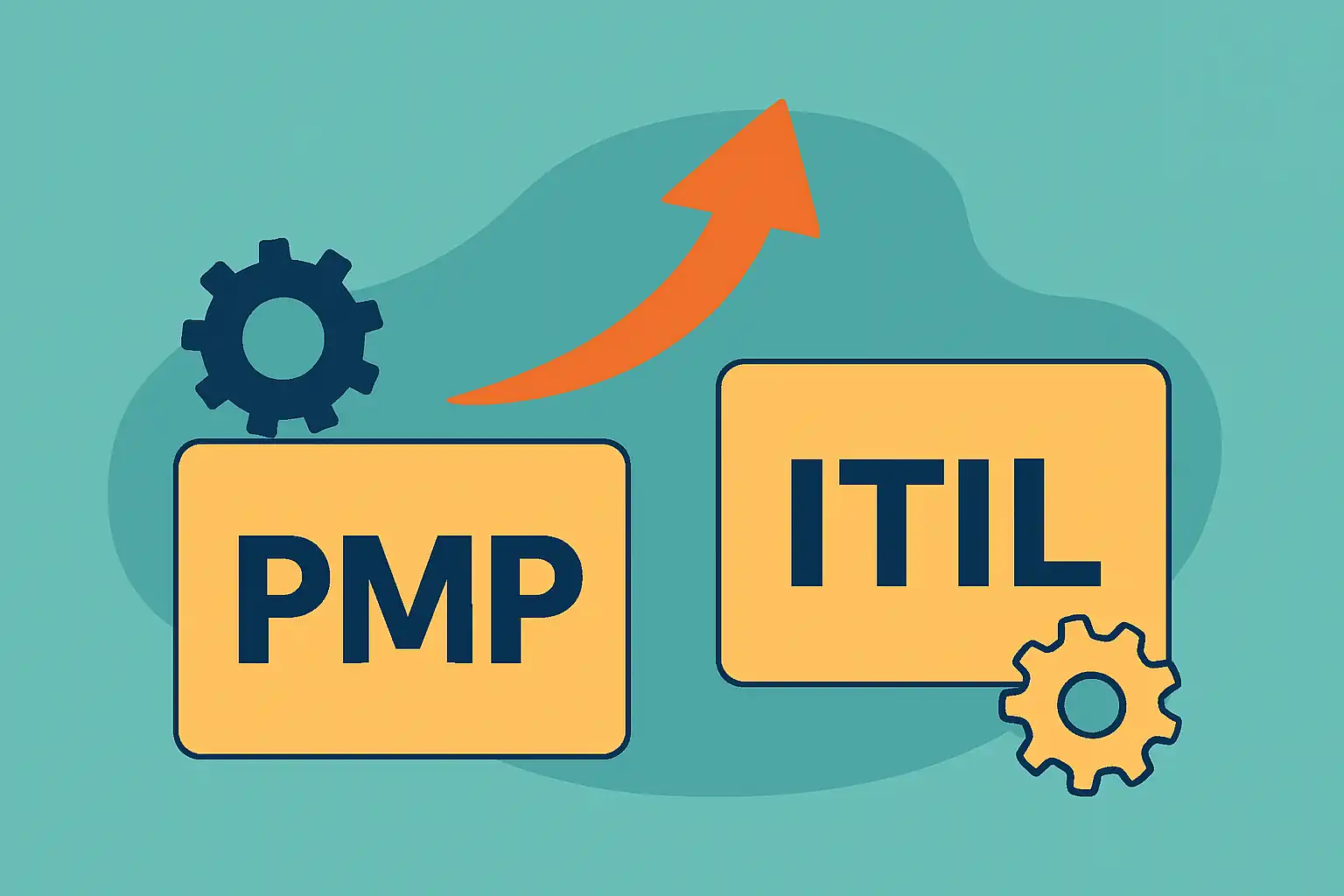Introduction
Two methodologies have emerged as pivotal in shaping how projects are executed and managed: Project Management Professional (PMP) and Information Technology Infrastructure Library (ITIL).
- Project Management Professional (PMP) is a globally recognized certification offered by the Project Management Institute (PMI). It provides a comprehensive framework for managing projects across various industries, emphasizing best practices, tools, and techniques that enhance project delivery and success rates. PMP certification is particularly valued for its broad applicability, making it relevant to a wide range of sectors beyond just IT [1][3].
- ITIL, on the other hand, focuses specifically on IT service management. It provides a set of practices designed to align IT services with the needs of the business, ensuring that IT delivers value to the organization. ITIL emphasizes service delivery, continuous improvement, and customer satisfaction, making it an essential framework for organizations that rely heavily on IT services [2][6].
While PMP offers a robust framework for managing projects, ITIL is increasingly recognized for its ability to optimize IT service management, which is crucial as organizations become more reliant on technology. The integration of ITIL practices into project management roles is gaining traction, as professionals seek to enhance their skill sets and improve service delivery within their projects [4][7].
This blog post aims to explore the growing importance of ITIL in project management roles, highlighting how its principles can complement the PMP framework. By understanding the synergy between these two methodologies, project management professionals can better navigate the complexities of modern projects and deliver greater value to their organizations.
Understanding PMP and ITIL
The integration of various methodologies has become increasingly important. Among these, the Project Management Professional (PMP) certification and the Information Technology Infrastructure Library (ITIL) framework stand out as two pivotal components. This section aims to provide a foundational understanding of both PMP and ITIL, highlighting their core principles and relevance in contemporary project management roles.
Overview of the PMP Certification
The Project Management Professional (PMP) certification, governed by the Project Management Institute (PMI), is a globally recognized standard for project managers. It validates the skills and expertise required to lead and direct projects effectively. Key aspects of the PMP certification include:
- Principles and Focus Areas: The PMP is based on the Project Management Body of Knowledge (PMBOK) guide, which outlines essential tools and techniques for project management. It encompasses five process groups—initiating, planning, executing, monitoring and controlling, and closing—and ten knowledge areas that cover various aspects of project management, such as scope, time, cost, quality, and risk management [1][3].
- Relevance to Project Management: The PMP certification signifies a high level of competence, demonstrating the ability to handle complex projects across diverse industries. It is particularly valuable for professionals seeking to enhance their project management skills and advance their careers [3].
Overview of ITIL
The Information Technology Infrastructure Library (ITIL) is a framework that provides best practices for IT service management (ITSM). It focuses on aligning IT services with the needs of the business and ensuring effective service delivery. Key features of ITIL include:
- Framework and Focus: ITIL emphasizes the management of IT services throughout their lifecycle, from service strategy and design to transition, operation, and continual service improvement. This holistic approach ensures that IT services are not only delivered efficiently but also aligned with business objectives [5][11].
- Relevance to Project Delivery: While ITIL is primarily centered on service management, it incorporates project management practices to enhance service delivery. This makes ITIL particularly relevant for organizations that rely on IT services to support their operations and strategic goals [4][14].
Comparison of the Methodologies
When comparing PMP and ITIL, it is essential to recognize their distinct approaches to project and service management:
- Different Approaches: PMP focuses on the entire project lifecycle, providing a structured methodology for managing projects from initiation to closure. In contrast, ITIL centers on the ongoing management of IT services, ensuring that they meet business needs and deliver value over time [5][6].
- Complementary Roles: Rather than being alternatives, PMP and ITIL can be seen as complementary methodologies. While PMP equips project managers with the skills to execute projects effectively, ITIL provides the framework for managing the services that result from those projects. This synergy is increasingly recognized in project management roles, as organizations seek professionals who can navigate both project and service management landscapes [8][14].
The Shift Towards ITIL in Project Management
The landscape of project management is undergoing significant transformation, driven by the increasing complexity of IT-related projects and the need for more structured frameworks to manage them effectively. As organizations strive to enhance efficiency and streamline processes, the integration of ITIL (Information Technology Infrastructure Library) principles alongside traditional project management methodologies like PMP (Project Management Professional) is becoming more prevalent.
Evolving Landscape of Project Management
The rapid advancement of technology has led to a surge in IT-related projects, which often involve intricate systems and require a high level of coordination among various stakeholders. This complexity necessitates a more robust approach to project management, where ITIL’s focus on service management and continuous improvement can complement the structured methodologies of PMP. As a result, project managers are increasingly recognizing the value of ITIL in addressing the unique challenges posed by IT projects, such as aligning IT services with business needs and ensuring quality service delivery.
Industry Trends Favoring ITIL Integration
Several industry trends indicate a growing integration of ITIL principles within project management roles:
- Increased Demand for Efficiency: Organizations are under pressure to achieve more with fewer resources. The combination of ITIL’s best practices with PMP’s project management techniques can lead to enhanced operational efficiency and improved project outcomes [1].
- Focus on Continuous Improvement: ITIL emphasizes the importance of continuous improvement in service delivery, which aligns well with the project management focus on delivering projects on time and within budget. This synergy is driving project managers to adopt ITIL practices to enhance their project management capabilities [2].
- Adoption of Agile Methodologies: The rise of Agile project management has also influenced the adoption of ITIL, as both frameworks prioritize flexibility and responsiveness to change. Organizations are increasingly looking for ways to integrate ITIL’s service management principles with Agile practices to create a more adaptive project environment [3].
Case Studies and Statistics
The tangible benefits of integrating ITIL with project management practices are evident in various case studies:
- Procter & Gamble: This organization successfully utilized ITIL alongside Agile project management to optimize their IT services and project workflows, resulting in a 20% increase in operational efficiency and faster product rollout times. Such case studies highlight the scalability and effectiveness of combining ITIL with traditional project management methodologies [4].
- Growing Certification Demand: The demand for project managers with both PMP and ITIL certifications is on the rise, reflecting the industry’s recognition of the value that ITIL brings to project management. This trend suggests that professionals who are well-versed in both frameworks are better positioned to meet the evolving needs of organizations [5].
Benefits of Integrating ITIL with PMP
The integration of ITIL (Information Technology Infrastructure Library) with PMP (Project Management Professional) methodologies is becoming increasingly significant. This combination not only enhances project outcomes but also aligns project goals with broader organizational objectives. Here are some key benefits of integrating ITIL practices with PMP standards:
- Enhanced Service Delivery: ITIL practices focus on service management, which can significantly improve project outcomes and client satisfaction. By adopting ITIL’s structured approach to service delivery, project managers can ensure that projects are not only completed on time and within budget but also meet the quality expectations of stakeholders. This service-oriented perspective helps in creating a more responsive and customer-centric project environment, ultimately leading to higher satisfaction rates among clients and end-users [1][2].
- Risk Management: ITIL plays a crucial role in managing risks associated with IT projects. By implementing ITIL’s best practices, project managers can proactively identify, assess, and mitigate risks throughout the project lifecycle. This includes managing incidents and changes effectively, which reduces the likelihood of disruptions and enhances the overall stability of IT services. The integration of ITIL’s risk management strategies with PMP’s comprehensive project management framework allows for a more robust approach to handling uncertainties, ensuring that projects remain on track even in the face of challenges [9][11].
- Alignment with Business Strategy: One of the most significant advantages of integrating ITIL with PMP is the alignment of project goals with organizational objectives. ITIL emphasizes the importance of understanding business needs and aligning IT services accordingly. By incorporating ITIL practices, project managers can ensure that their projects contribute to the strategic goals of the organization, thereby enhancing the overall value delivered by IT initiatives. This alignment not only improves project relevance but also fosters better communication and collaboration between project teams and business stakeholders [3][12].
Challenges in Integrating ITIL and PMP
As project management continues to evolve, the integration of various methodologies has become increasingly important. Among these, the Information Technology Infrastructure Library (ITIL) is gaining traction alongside the Project Management Professional (PMP) framework. However, project managers face several challenges when attempting to merge these two methodologies effectively. Here are some key obstacles to consider:
- Cultural Resistance within Organizations: One of the most significant barriers to adopting ITIL alongside PMP is the existing company culture. Organizations often have entrenched practices and mindsets that can resist change. When ITIL is perceived as a new set of processes that disrupts the status quo, employees may be reluctant to embrace it. This cultural resistance can hinder the successful implementation of ITIL practices, making it essential for project managers to foster a culture of openness and adaptability to facilitate integration [1][5].
- Training and Certification Challenges: The need for ongoing education and certification in both ITIL and PMP is crucial for project managers. As these frameworks evolve, professionals must stay updated on best practices and methodologies. However, the availability of training programs and resources can vary, leading to gaps in knowledge and skills. Project managers may find it challenging to allocate time and budget for comprehensive training, which can impede their ability to effectively integrate both methodologies into their projects [2][11].
- Balancing Frameworks: Integrating ITIL and PMP processes requires careful consideration to ensure that they complement each other rather than conflict. Each framework has its own set of processes, terminologies, and objectives, which can create confusion if not managed properly. Project managers must navigate the complexities of aligning ITIL’s service-oriented approach with PMP’s structured project management practices. This balancing act can be particularly challenging when trying to maintain project timelines and deliverables while also adhering to ITIL’s continuous improvement philosophy [3][6][10].
Future Trends in Project Management: ITIL’s Role
As project management continues to evolve, the integration of frameworks like ITIL (Information Technology Infrastructure Library) alongside traditional methodologies such as PMP (Project Management Professional) is becoming increasingly significant. This section explores the future trends in project management, focusing on the growing importance of ITIL and its impact on the field.
Emerging Technologies and Their Influence on ITIL and PMP Practices
The rapid advancement of technology is reshaping project management practices. Emerging technologies such as artificial intelligence (AI), data analytics, and automation are enhancing the capabilities of both ITIL and PMP methodologies.
- AI and Data Analytics: These technologies provide project managers with data-driven insights, enabling more informed decision-making and improved project outcomes. ITIL’s structured approach complements these technologies by offering a framework for managing IT services effectively, which is crucial in a tech-driven environment [4].
- Integration of Agile Methodologies: The rise of Agile practices has prompted ITIL to adapt, allowing for greater flexibility and responsiveness in project management. This integration helps organizations to remain competitive and meet the dynamic needs of their clients [9].
Predictions on the Future Demand for ITIL-Trained Project Managers
As organizations increasingly recognize the value of ITIL in enhancing operational efficiency and service delivery, the demand for ITIL-trained project managers is expected to rise significantly.
- Growing Job Market: By 2027, the USA alone is projected to have 22 million new project management job vacancies, indicating a robust market for professionals skilled in both PMP and ITIL methodologies [11].
- Strategic Importance of ITIL: ITIL is evolving from a purely administrative framework to a strategic powerhouse within organizations, which will likely lead to a higher demand for project managers who are proficient in ITIL practices [6].
The Importance of Agility and Adaptability in Project Management
In today’s fast-paced business environment, the ability to adapt and respond to change is crucial for project success. ITIL supports these traits by promoting a culture of continuous improvement and flexibility.
- Support for Agile Practices: ITIL’s principles encourage project managers to embrace change and implement processes that are both efficient and adaptable to shifting business needs. This alignment with Agile methodologies enhances the overall effectiveness of project management [12].
- Focus on Sustainability: As sustainability becomes a priority in project management, ITIL’s emphasis on reducing waste and considering environmental impacts aligns well with the growing demand for green project management practices [5].
Conclusion
The integration of ITIL (Information Technology Infrastructure Library) with PMP (Project Management Professional) methodologies is becoming increasingly significant. As organizations strive for efficiency and effectiveness in their project delivery, understanding how to leverage both frameworks can provide a competitive edge.
- Integration of ITIL and PMP: The synergy between ITIL and PMP is essential for modern project managers. While PMP offers a comprehensive framework for managing projects across various industries, ITIL focuses on optimizing IT service management. This integration allows project managers to not only deliver projects successfully but also ensure that the services provided meet the highest standards of quality and efficiency. By understanding when to apply specific ITIL processes alongside PMP practices, project managers can enhance their project outcomes and align them with organizational goals [1][7].
- Further Education in ITIL: As ITIL continues to gain traction in project management roles, it is crucial for professionals to consider further education in this area. Gaining ITIL certification can equip project managers with valuable skills in service-level delivery, which complements the project management skills acquired through PMP certification. This dual expertise can open doors to new career opportunities and enhance one’s ability to manage projects that involve IT services [4][5].
- Engagement and Resources: We encourage project management professionals to engage with the community and explore additional resources on the integration of ITIL and PMP. Participating in forums, attending workshops, or accessing online courses can provide deeper insights into how these methodologies can work together effectively. By staying informed and connected, professionals can better navigate the complexities of project management in today’s fast-paced environment [9][10].
In summary, the growing importance of ITIL alongside PMP in project management cannot be overstated. Embracing both frameworks will not only enhance individual skill sets but also contribute to the overall success of projects within organizations.
Find out more about Shaun Stoltz https://www.shaunstoltz.com/about/.
This post was written by an AI and reviewed/edited by a human.



